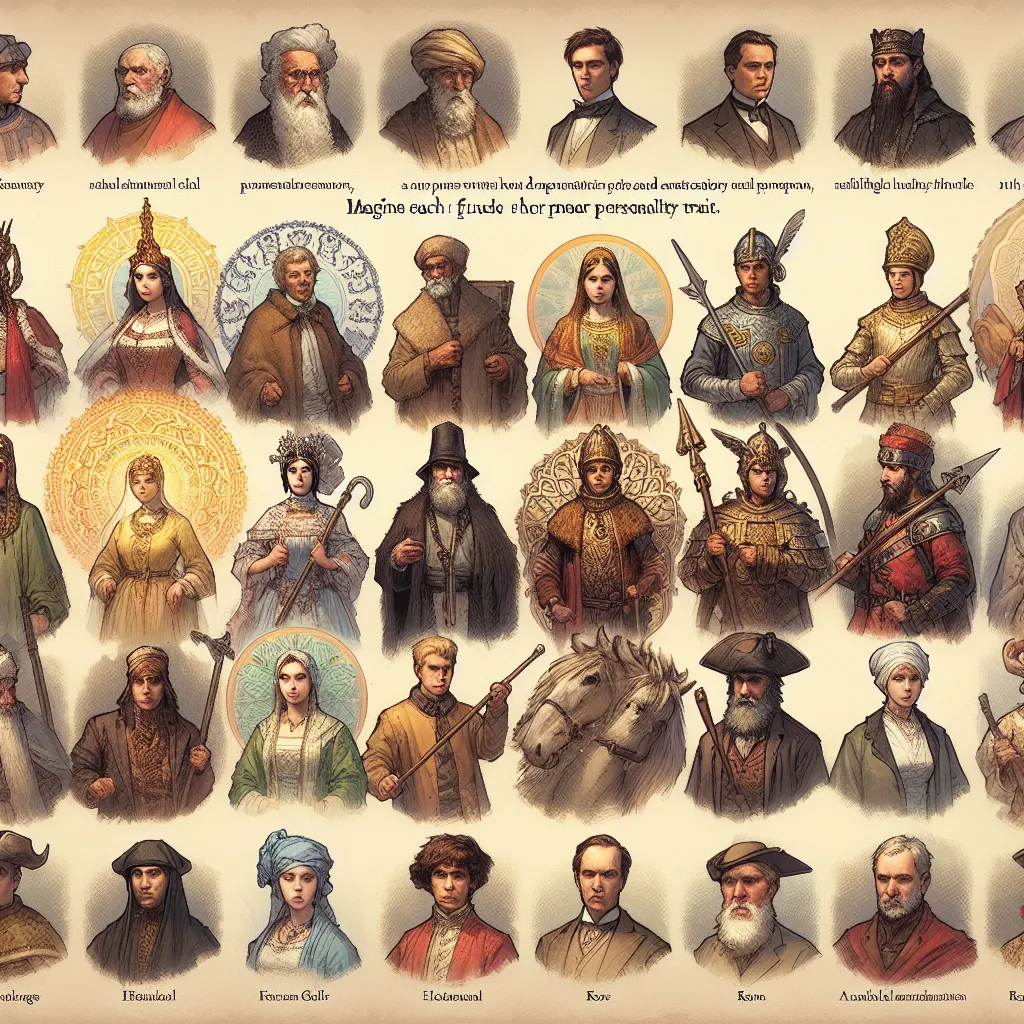Historical Figures and Their Personality Traits: A Theoretical Analysis
Throughout history, many individuals have left an indelible mark on the fabric of time. These historical figures, with their diverse personalities, have shaped events, influenced cultures, and transformed societies. From the strategic genius of military leaders to the creative brilliance of artists, each of these individuals exhibited personality traits that not only defined their characters but also contributed to their legacies. This article takes a theoretical analysis into the lives of some of the world’s most renowned historical figures and the distinctive personality traits they possessed.
First on the list is Alexander the Great, a name synonymous with conquest and military prowess. Alexander’s relentless ambition and visionary leadership are perhaps the most significant traits that underline his historical presence. A student of Aristotle, Alexander was not only a formidable warrior but also intellectually curious, which fueled his desire to understand and conquer the known world. His confidence, charisma, and ability to inspire loyalty among his troops were paramount to his string of uninterrupted victories.
Next is Cleopatra VII Philopator, the last active ruler of the Ptolemaic Kingdom of Egypt. Often remembered for her beauty, Cleopatra was much more than an attractive face. Her intelligence, political shrewdness, and diplomatic skills were extraordinary. She was a polyglot, capable of speaking multiple languages, which allowed her to negotiate without intermediaries. Her influence over Roman politicians like Julius Caesar and Mark Antony also testifies to her strong interpersonal skills and strategic thinking.
Moving forwards to the Renaissance era, Leonardo da Vinci is a figure who epitomizes the term ‘Renaissance man’ due to his manifold skills. An artist, inventor, and scientist, Leonardo’s insatiable curiosity and innovative thinking were at the core of his personality. His meticulous observations and detailed journals reveal a man devoted to learning and perfectionism in every endeavor. His willingness to challenge accepted norms and think beyond the boundaries of his time was transformative, not just for art but the broad spectrum of human knowledge.
In stark contrast to Leonardo’s peaceful contributions, Genghis Khan, the founder of the Mongol Empire, is known for his ruthlessness and exceptional leadership skills. His ability to unify the diverse Mongol tribes and drive them to establish one of the largest empires ever known showed his outstanding organizational and strategic capabilities. Genghis Khan was decisive, pragmatic, and an advocate of meritocracy, which allowed him to build a robust and loyal military hierarchy.
When speaking of transformative figures, one cannot omit the name of Mahatma Gandhi. An unassuming man who led with humility and nonviolence, Gandhi’s personality was the antithesis of aggression and power. His steadfast adherence to truth, nonviolence, and civil disobedience became powerful tools in his quest for India’s independence from British rule. Gandhi’s moral conviction and resilience demonstrated how impactful peaceful resistance could be in the face of oppression, a theory that influenced civil rights movements worldwide.
A modern influencer of political ideology, and the purveyor of a new epoch in industrial relations, is Winston Churchill. Best known for his leadership during World War II, Churchill’s oratory skills, determination, and indomitable spirit rallied the British people at a time of despair and uncertainty. His ability to convey hope and resilience through his speeches remains a testament to his extraordinary communicative abilities.
Moving across the pond, one of the United States’ most iconic historical figures is Abraham Lincoln. His leadership during the Civil War and his efforts to abolish slavery revealed defining traits such as integrity, empathy, and a strong sense of justice. Lincoln’s capacity for critical thinking and eloquent expression also shone through in moments such as the Gettysburg Address, encapsulating the pain and hope of a divided nation.
Another beacon in history known for her humanitarian contributions and leadership is Florence Nightingale. Often called ‘The Lady with the Lamp,’ Florence revolutionized nursing during the Crimean War. Her compassion, commitment to patient care, and meticulous approach to hygiene and sanitary conditions saved countless lives. Florence’s determination and advocacy for healthcare reform painted a picture of a resilient and compassionate leader dedicated to the well-being of others.
Shifting focus to the artistic realm, Frida Kahlo, the celebrated Mexican painter, embodied resilience and self-expression. Despite facing personal tragedies and physical pain throughout her life, Frida channeled these experiences into her art, creating deeply personal and vivid paintings that continue to resonate with audiences today. Her authenticity and emotional depth were instrumental in establishing her place as a feminist icon and an influential figure in modern art.
Finally, the contemplative and enigmatic physicist Albert Einstein altered our understanding of the universe with his theory of relativity. Albert’s intellectual creativity, unconventional thinking, and rebellious nature against established scientific norms were central to his character. These personality traits, along with his pacifism and humanitarian pursuits, made him not only a scientific pioneer but also a voice of reason in times of turmoil.
In summing up this theoretical analysis of historical figures and their personality traits, it is clear that each individual’s unique characteristics were instrumental in their ability to impact history. Whether through courage, creativity, intellect, or compassion, these personality traits formed the foundation upon which their legacies were built. They serve as a reminder of the power of individual traits to shape the world and influence future generations. Even though these personalities lived in different eras and came from various backgrounds, their traits continue to inspire and teach lessons about human potential and greatness.
As we reflect on the influence of historical personalities, it is important to consider the implications of their traits on leadership, innovation, and social change. Studying the lives and characters of these figures provides insight into the complexities of human nature and the potential within each person to make a difference in the world. Whether we learn from Alexander’s ambition, Cleopatra’s diplomacy, Leonardo’s curiosity, Genghis Khan’s strategic acumen, Gandhi’s conviction, Churchill’s oratory, Lincoln’s integrity, Nightingale’s compassion, Kahlo’s authenticity, or Einstein’s creativity, each trait offers a window into the making of history.
In conclusion, while historical contexts vary, the common thread that ties all these iconic figures together is the distinct set of personality traits that they exhibited. These traits not only defined their actions and decisions but also played a critical role in the advancements and evolutions of their respective societies. By examining the characteristics of these historical figures, we gain a deeper understanding of the formula that can potentially mold influential leaders and innovators. This theoretical analysis underlines the significance of individual personality traits and their lasting impact on the tapestry of human history.



Leave a Comment